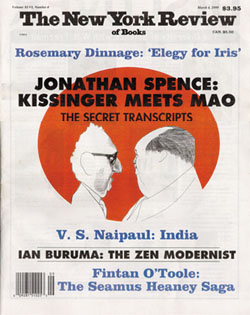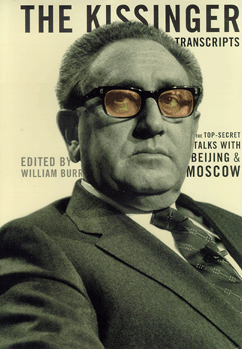

WASHINGTON, D.C., 10 January 1999 -- The National Security Archive at George Washington University today released its new book of previously top secret transcripts of Henry Kissinger's meetings with Chinese and Soviet leaders while he served as national security adviser and Secretary of State in the Nixon and Ford administrations, including the full transcript of the historic first meeting between Nixon and Mao in February 1972.
The transcripts fill in major gaps in Kissinger's memoir version of his triangular diplomacy with Beijing and Moscow, revealing his previously secret attempt to create a "tacit alliance" with China while deceiving the Soviets about the relationship. According to the transcripts, Kissinger repeatedly offered satellite intelligence to the Chinese from 1971 to 1973, high speed computers in 1975, and even a hot line for early warning on Soviet troop movements.
These never-before-published near-verbatim transcripts, most of which were previously classified "Top Secret/Sensitive/Exclusively Eyes Only," provide scintillating detail on the personalities of world leaders like Mao, Brezhnev, Nixon and Kissinger himself, such as Mao's query to Kissinger (and then-Ambassador George Bush) about Jewish ownership of American newspapers.
Published by The New Press (distributed by W.W. Norton & Co.), the book resulted from a 6-year investigation by National Security Archive staff led by senior analyst William Burr, a Ph.D. diplomatic historian, who reconstructed this record through Freedom of Information Act requests and archival sleuthing. The only complete set of these transcripts remains locked in the Library of Congress under Kissinger's personal control, unavailable to the public without his permission until 5 years after his death; but Archive staff tracked down copies in Nixon and Ford presidential papers, State Department files, and in the papers of Kissinger's aides.
The National Security Archive is a public interest research library located at George Washington University. Founded in 1985, the Archive now holds "the largest collection of contemporary declassified national security information outside the U.S. government," according to the Christian Science Monitor. A project of The Fund for Peace supported by foundation grants and publication royalties, the Archive has become a "Nexis of national security," according to the Washington Journalism Review, and "a state-of-the-art index to history."
No hay comentarios:
Publicar un comentario